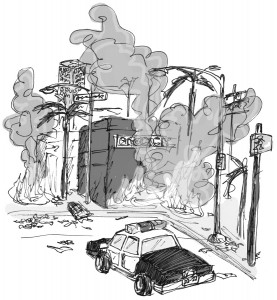Rodney King riots still resonate with city
Almost 20 years ago, when most of us were in our early infancies, Los Angeles was burning.
The acquittal of the four Los Angeles Police Department officers involved in the beating of Rodney King sparked one of the most incendiary events in L.A. history. Violence riddled the landscape. It brought to the forefront many grievances that, until then, had been grumbled as complaints.
Along with an assortment of panels and events, The Riot Within: My Journey From Rebellion To Redemption — the new memoir by Rodney King — has made sure that the riots are not forgotten. But these mementos shouldn’t simply remind us of what happened: They need to serve as a catalyst for further efforts to improve the relationship between the LAPD and the communities it serves.
The police department has come a long way in 20 years. An independent commission investigating the LAPD’s practices after King’s beating — but before the riots ignited — found “excessive force, racist cops, indifferent commanders and disdain for residents,” according to reports. The situation was bleak, and the Rampart scandal that took place two years later only served to aggravate it.
In the wake of the riots, however, the seeds for improvement were sewn. Community policing was introduced in an effort to build trust between the LAPD and L.A. residents. According to the U.S. Department of Justice’s website, community policing is “a philosophy that promotes … the systematic use of partnerships and problem-solving techniques.”
The 77th Street Division, which stretches from Watts to Inglewood, had 143 homicides in 1992. That figure decreased to 32 in 2011. The area is not the safest place to live in, but the improvement is there. Residents of troubled areas approach LAPD officers for solutions much more often. Altercations that could escalate into violence between police officers and residents are diffused with talk and reason.
A recent poll by the Center for the Study of Los Angeles at Loyola Marymount University found that 70 percent of L.A. residents approve of the police force that was at the center of such unrest two decades ago. Still, things are not as good as they could be. Seventy percent means that out of every 10 residents, three are dissatisfied with the way the LAPD goes about its business. Yes, approval polls are a sketchy business, but many holders of public office — like the president, for example — would be delighted with such a score.
But an approval rating for an entity like the LAPD is different. The LAPD was founded more than 143 years ago, and it will be around for the foreseeable future. An approval rating like the one the LAPD has must be earned over time through building trust. A willingness to cooperate, however, is still lacking from L.A. residents and the LAPD.
At USC, we have had to interact with the LAPD more often than usual in the last few weeks. Two graduate students were fatally shot, and a DPS officer shot an armed man on 30th street. The officers have shown how far they have come in their ability to handle tough situations.
The LAPD still receives some animosity — especially from younger people, whose pastimes are more likely to skirt the boundaries of legality. These feelings, however, have greatly diminished in the last 20 years. If the department continues using community policing, its approval rating will reflect more trust from the community.
Daniel Grzywacz is a sophomore majoring in neuroscience and anthropology. His column “72 Degrees and Shaking” ran Wednesdays.


Why are there so many articles about the riots focusing on the improvements LAPD made and still needs to make with the community? Why are we so fearful of talking about the pink elephant in the room? South Central LA needs to improve itself and just dropping “Central” from its name will not make for substantive improvements. In fact those stupid, superficial, symbolic “solutions” are the kind of ridiculous salve for the wound our failing politicians gravitate towards – hoping their constituents are dumb enough to play along.
By and large ask any USC student today if their relationship with their parents was instrumental at their acceptance into USC or their relationship with their local police dept. Of course it is the parents of the people in South Central LA that are in a position to affect the lives of their kids and future generations to come. Why do we not talk about fathers sticking around to raise the babies they make. Why not talk about single young mothers struggling to raise 3 kids by themselves – only to maintain lifestyle choices that put them on a collision course with baby number 4. Seriously – how may typical USC students even ever had a run in with their local police dept or care? The ones that never had any trouble with their local police dept are also the ones that most likely had parents that were responsible and willing to actually parent their kids.
We can talk about all the community policing we want but until kids have intelligent, responsible parents to raise them – these generations of South Central LA kids will always be bickering and squabbling with the law. I challenge any liberal, naive person to witness first hand what these cops go through patrolling some of the most dangerous streets in the US and put yourself in their shoes everytime you want to open your mouth and start to say “if I was that officer, I would have done…” You sound ridiculous.